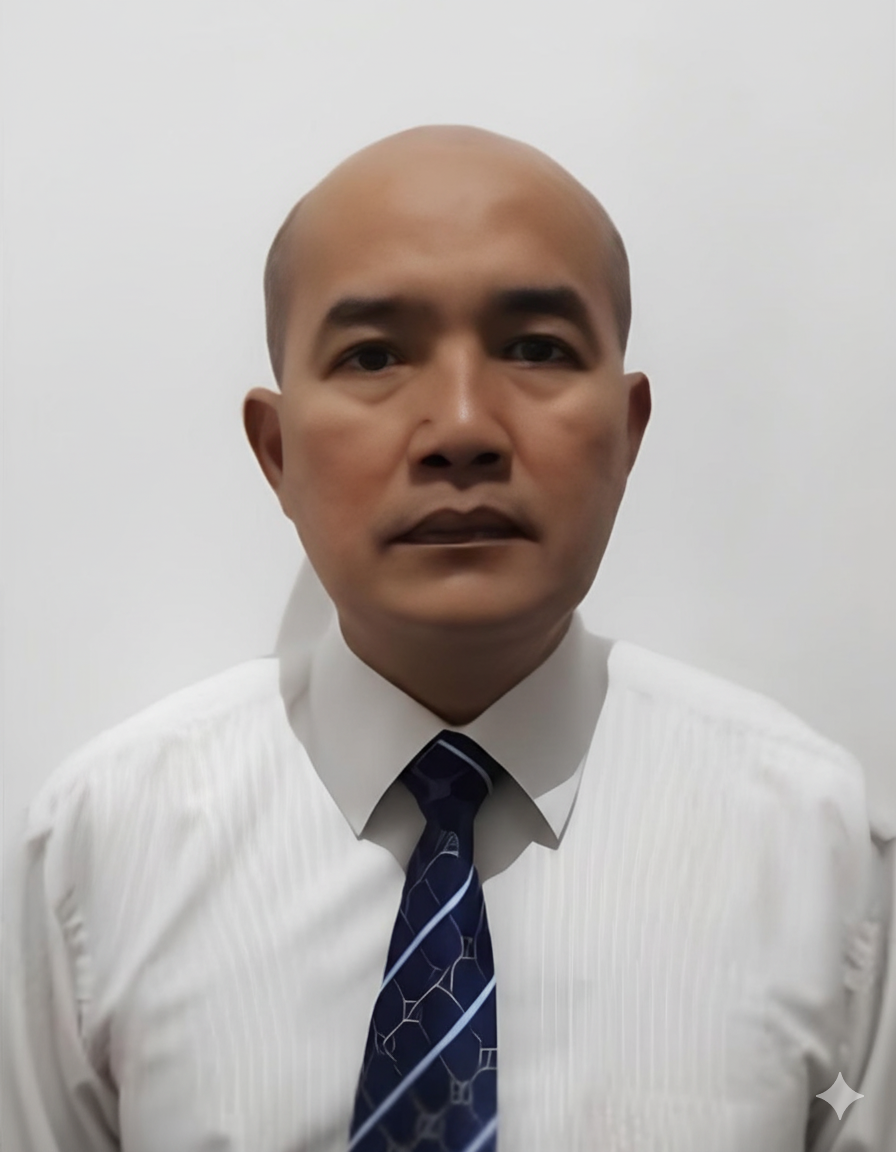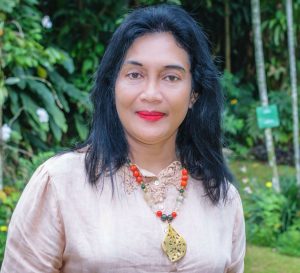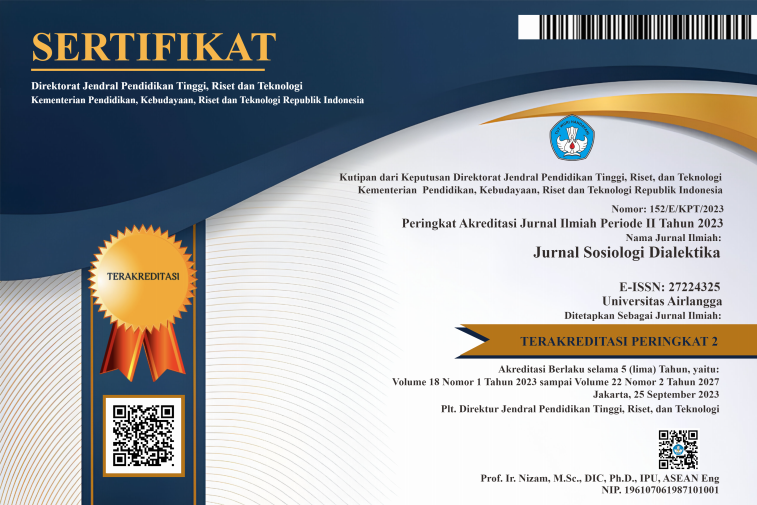Muakhi culture as ethnic conflict management in Lampung
Downloads
Andria RD (2019) Transmigrasi masa doeloe kini dan harapan kedepan. [Accessed 26 July 2021]. https://disnakermobduk.acehprov.go.id/index.php/jelajah/read/2019/02/07/7/transmigrasi-masa-doeloe-kini-dan-harapan-kedepan.html.
Bakri H (2015) Resolusi konflik melalui pendekatan kearifan lokal pela gandong di Kota Ambon. Jurnal Magister Ilmu Politik 1 (1):51-60.
Budianto A (2020) Ketegangan sosial di Lampung akibat program transmigrasi di era 1950an. Jurnal Candi 20 (1):18-31.
Creswell JW (2012) Research Design, Pendekatan Kualitatif, Kuantitatif dan Mixied. Jakarta: Pustaka Pelajar.
Ferdian JK (2017) Model resolusi konflik kawasan register 45 Mesuji Lampung berbasis hutan tanaman rakyat. Politika: Jurnal Ilmu Politik 8 (1):92-102. https://doi.org/10.14710/politika.8.1.2017.92-102.
Ghozali AM (2020) The concept of conflict management in the medina charter. Atlantis Press 492 (RIICMuSSS 2019):58-263. https://doi.org/10.2991/assehr.k.201113.049.
Hartoyo (2019) Muakhi (brotherhood) and its practices related to preventing communal conflict in multicultural societies. Masyarakat, Kebudayaan dan Politik 32 (3):227-239.
Irham A (2013) Kebijakan politik multikultural dan upaya mencegah konflik sosial berbau sara: Belajar kasus Waypanji Lampung Selatan. TAPIs 9 (1):1-15. https://doi.org/https://doi.org/10.24042/tps.v9i1.1571.
Khoiriyah F, Fahri A, Bramantio B, & Sumargono S (2019) Sejarah toponimi daerah transmigrasi Provinsi Lampung melalui tuturan tradisi lisan. Agastya: Jurnal Sejarah dan Pembelajarannya 9 (2):221-240. https://doi.org/10.25273/ajsp.v9i2.4419.
Kriyantono R (2014) Teknik Praktis Riset Komunikasi. Jakarta: Kencana Prenadamedia.
Levang P (2003) Ayo ke Tanah Sabrang. Jakarta: KPG (Kepustakaan Populer Gramedia).
Miall H (2004) Conflict Transformation: A Multi-Dimensional Task. In: Austin A, Fischer M, & Ropers N (eds). Transforming Ethnopolitical Conflict. VS Verlag für Sozialwissenschaften Wiesbaden. https://doi.org/10.1007/978-3-663-05642-3_4.
Minandar CA (2019) Aktualisasi piil pesenggiri sebagai falsafah hidup mahasiswa Lampung di tanah rantau. Sosietas 8 (2):517-526. https://doi.org/10.17509/sosietas.v8i2.14594.
Moleong LJ (2015) Metodologi Penelitian Kualitatif. Jakarta: Remadja Karya.
Nurdin AF (2009) Budaya Muakhi. Jakarta: Gama Media.
Nurdin AF (2009) Budaya muakhi dan pembangunan daerah menuju masyarakat bermartabat. Jakarta: Gama Media.
Nurdin AF (2019) Integralisme Islam dan kontribusi budaya muakhi bagi peradaban masyarakat serta relevansi nilai-nilai filosofis budaya lokal dan pembangunan masyarakat Lampung. Al-Adyan 14 (1):35-50. https://doi.org/https://doi.org/10.24042/ajsla.v14i1.4481.
Nurdin BV (2017) Nemui Nyimah: Kearifan lokal untuk pembangunan toleransi yang berkualitas. Aura 1 (1):81–90).
Pratiwi D & Insani M (2019) Bagelen desa transmigrasi pasca reformasi di Lampung. Seminar Nasional Sejarah ke 4 Jurusan Pendidikan Sejarah Universitas Negeri Padang 374-383. https://doi.org/https://doi.org/10.31227/osf.io/kmgy3.
Prayitno S (2019) Penanganan pasca konflik sosial di Lampung Selatan (studi pada wilayah Polda Lampung). Cepalo 3 (1):35-40. https://doi.org/10.25041/cepalo.v3no1.1788.
Putra MGBA (2013) Peran kearifan lokal dalam resolusi konflik keyakinan beragama di Jawa Timur. Masyarakat, Kebudayaan dan Politik 26 (1):1-14.
Qurun KA & Dudha LPR (2020) Filosofi budaya muakhi perspektif Fauzie Nurdin. Indonesian Journal of Islamic Theology and Philosophy 2 (2):121-136. https://doi.org/https://doi.org/10.24042/ijitp.v2i2.6998.
Rahma MA & Lestari SB (2020) Manajemen konflik organisasi untuk menjaga komitmen dalam Unit Kegiatan Selam 387 Universitas Diponegoro. Interaksi Online 8 (1):202-232.
Rusdiana (2019) Manajemen Konflik. Jakarta: Pustaka Setia.
Ruslan I (2018) Dimensi kearifan lokal masyarakat Lampung sebagai media resolusi konflik. Kalam 12 (1):105-126. https://doi.org/10.24042/klm.v12i1.2347.
Singagerda SF, Alfian F, Sari N, & Akbar MF (2020) Islamic integralism and muakhi culture: The relevance of philosophical values of local culture and Lampung community development. International Journal of Disaster Recovery and Business Continuity 11 (3):1880-1892. http://sersc.org/journals/index.php/IJDRBC/article/view/33848.
SarbiniA & Khalik AT (2010) Budaya Lampung Versi Adat Megou Pa' Tulang Bawang. Yogyakarta: Badan Penerbitan Filsafat UGM.
Setiyani W (2016) Tipologi dan tata kelola resolusi konflik di tinjau dari perspektif teori sosial konflik. Teosofi 6 (2):275-299. https://doi.org/https://doi.org/10.15642/teosofi.2016.6.2.275-299.
Sinaga RM (2017) Revitalisasi Buadaya: Strategi Identitas Etnik Lampungle. Jakarta: Suluh Media.
Sugiyono (2016) Metode Penelitian Kuantitatif, Kualitatif dan R&D. Bandung: Alfabeta Bandung.
Susan N (2009) Sosiologi Konflik: Teori-teori dan Analisis. Surabaya: Prenada Group.
Susan N (2011) Tata kelola konflik demokrasi: Kasus tata kelola konflik di Aceh. Global Strategis 5 (1):15-31.
Syahputra MC & Ruslan I (2021) Nemui nyimah: Lampung local wisdom with religious moderation insight. Akademika: Jurnal Pemikiran Islam 26 (1):59-74.
Syufa'at MA, Cahyono H, & Madku A (2017) Gerakan agama dan budaya komunitas Sekelik Sedulur dalam mencegah konflik etnis di Lampung Tengah. Ri'ayah: Jurnal Sosial dan Keagamaan 2 (1):64-84.
Taufik A (2018) Tata kelola konflik dalam pemilihan kepala desa di Kabupaten Bantaeng. Jurnal Politikom Indonesiana 3 (1):14-25. https://doi.org/10.31227/osf.io/bjruv.
Wirawan (2018) Konflik dan Managemen Konflik. Jakarta: Salemba Humanika.
1. Copyright of this journal is possession of Editorial Board and Journal Manager, by the knowledge of author, whilst the moral right of the publication belongs to the author.
2. Legal formal aspect of journal publication accessibility refers to Creative Commons Attribution-NonCommercial-ShareAlike (CC BY-NC-SA), implies that publication can be used for non-commercial purposes in its original form (cannot be modified).
3. Every publications (printed/electronic) are open access for educational purposes, research, and library. Other that the aims mentioned above, editorial board is not responsible for copyright violation.















